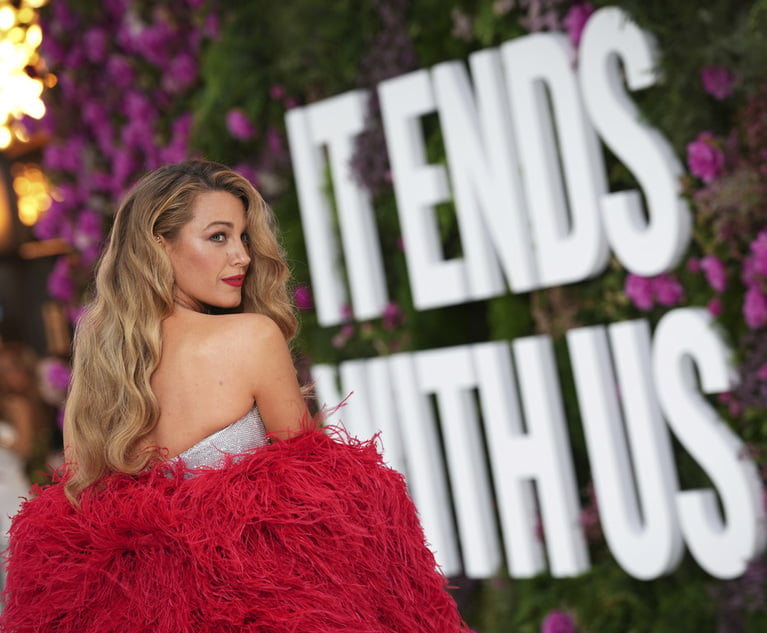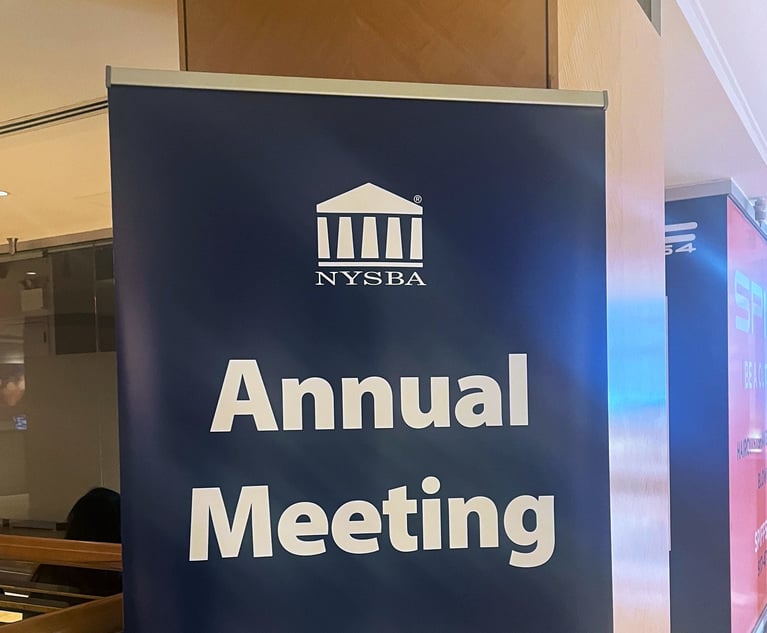After Remand, Judge, Again, Grants Class Cert in Goldman Securities Suit
U.S. District Judge Paul Crotty said the defendants were unable to defeat the 'Basic' presumption afforded the plaintiffs based on a preponderance of evidence.
August 15, 2018 at 04:40 PM
4 minute read
 Photo: Shutterstock
Photo: Shutterstock
The longstanding suit over housing bubble-era investment actions taken by Goldman Sachs has recently moved between the district court in Manhattan and the U.S. Court of Appeals for the Second Circuit since being filed in 2010.
Late on Tuesday, the suit shifted back in favor of the plaintiffs, after U.S. District Judge Paul Crotty of the Southern District of New York again granted class certification to the investors in the suit. This, after an appellate panel in January reversed and remanded Crotty's earlier class certification and instructed the district court to review evidence that Goldman believed defeated the class.
The suit was first filed shortly after the housing market bubble popped. The plaintiffs accused Goldman of making public misstatements about the conflicts of interest policies and business practices related to funds dealing in collateralized debt obligations backed by residential mortgage-backed securities. These include the Abacus fund that allowed its client, investor John Paulson's hedge fund, to have an active role in selecting assets for the fund, without disclosing the fact Paulson held the sole short position.
The suit's lengthy proceedings ultimately ended up at the Second Circuit on interlocutory appeal over the initial class certification. There, the panel sided with Goldman over issues related to the standard for securities class actions laid down in the U.S. Supreme Court's 1988 decision in Basic v. Levinson.
On remand, Crotty reviewed the Basic presumption, which relies on the fraud-on-the-market-theory. Defendants could rebut the Basic presumption and defeat class certification, the appellate panel said, if, by a preponderance of the evidence, that the misstatements can be shown not to have had an effect on the market.
In his 11-page decision, Crotty quickly found that the witnesses and evidence put on by Goldman failed to do just that.
The plaintiffs' expert testified that the misstatements, while not themselves the cause of inflated stock prices, served to maintain the inflated price. The inflation was allegedly uncovered on three specific dates, when federal regulators and prosecutors at different times began investigating Goldman's fund management practices, after which Goldman's stock price declined.
Two separate Goldman experts testified in opposition. The experts noted that on 36 occasions during the relevant time periods, news stories appeared about Goldman's conflicts in the funds and none had an impact on the company's stock price. This, according to Crotty, supposedly proved the misstatements had no price impact, and that the revelation of client conflicts had not contributed to the later declines after government investigations were revealed.
The experts also suggested that the price declines that did happen were exclusively due to enforcement activities.
The arguments were unavailing to Crotty, who found the plaintiffs' arguments established a link between the news of Goldman's conflicts and the subsequent stock decline, which was sufficient to meet the Basic presumption. The reports of government action provided new information not described in the 36 news articles, making them more credible and reliable, the judge said. The experts failed to credibly explain how the hard evidence revealed by government investigators about the scope of Goldman's conflicts did not contribute to the price decline that followed, according to the judge.
The argument that the news of the enforcement themselves was the cause of the decline also failed, as it relied on a flawed analysis tied to small samples of similar scenarios for other companies, Crotty found.
“Defendants have failed to tip the scale in their favor on this issue,” the judge wrote.
The debate over this key aspect of the suit is likely far from over. An appeal appears certain, sooner or later, as the Second Circuit's decisions in similar cases will be used to argue that similar statements by other banks and firms can have no price impact.
Goldman's legal team is led by Sullivan & Cromwell partner Robert Giuffra Jr. He declined to comment.
The lead plaintiffs are represented by co-counsel Labaton Sucharow partner Thomas Dubbs and Robbins Geller Rudman & Dowd partner Spencer Burkholz. They declined to comment.
This content has been archived. It is available through our partners, LexisNexis® and Bloomberg Law.
To view this content, please continue to their sites.
Not a Lexis Subscriber?
Subscribe Now
Not a Bloomberg Law Subscriber?
Subscribe Now
NOT FOR REPRINT
© 2025 ALM Global, LLC, All Rights Reserved. Request academic re-use from www.copyright.com. All other uses, submit a request to [email protected]. For more information visit Asset & Logo Licensing.
You Might Like
View All
Blake Lively’s Case Highlights How Pre-Litigation Subpoenas Can Expose Harassment in Hollywood
5 minute read


NYSBA Annual Meeting: How In-House Counsel Navigate Gen AI Risk
Trending Stories
- 1The Legal Status of Presidential Diaries Must Be Clarified
- 2Litigators of the Week: Shortly After Name Partner Kathleen Sullivan’s Retirement, Quinn Emanuel Scores Appellate Win for Vimeo
- 3Litigator of the Week Runners-Up and Shout-Outs
- 4Weil Hires White & Case Partner in Rebuild of London Finance Ranks
- 5Morgan Lewis Closes Shenzhen Office After Less Than Two Years
Who Got The Work
J. Brugh Lower of Gibbons has entered an appearance for industrial equipment supplier Devco Corporation in a pending trademark infringement lawsuit. The suit, accusing the defendant of selling knock-off Graco products, was filed Dec. 18 in New Jersey District Court by Rivkin Radler on behalf of Graco Inc. and Graco Minnesota. The case, assigned to U.S. District Judge Zahid N. Quraishi, is 3:24-cv-11294, Graco Inc. et al v. Devco Corporation.
Who Got The Work
Rebecca Maller-Stein and Kent A. Yalowitz of Arnold & Porter Kaye Scholer have entered their appearances for Hanaco Venture Capital and its executives, Lior Prosor and David Frankel, in a pending securities lawsuit. The action, filed on Dec. 24 in New York Southern District Court by Zell, Aron & Co. on behalf of Goldeneye Advisors, accuses the defendants of negligently and fraudulently managing the plaintiff's $1 million investment. The case, assigned to U.S. District Judge Vernon S. Broderick, is 1:24-cv-09918, Goldeneye Advisors, LLC v. Hanaco Venture Capital, Ltd. et al.
Who Got The Work
Attorneys from A&O Shearman has stepped in as defense counsel for Toronto-Dominion Bank and other defendants in a pending securities class action. The suit, filed Dec. 11 in New York Southern District Court by Bleichmar Fonti & Auld, accuses the defendants of concealing the bank's 'pervasive' deficiencies in regards to its compliance with the Bank Secrecy Act and the quality of its anti-money laundering controls. The case, assigned to U.S. District Judge Arun Subramanian, is 1:24-cv-09445, Gonzalez v. The Toronto-Dominion Bank et al.
Who Got The Work
Crown Castle International, a Pennsylvania company providing shared communications infrastructure, has turned to Luke D. Wolf of Gordon Rees Scully Mansukhani to fend off a pending breach-of-contract lawsuit. The court action, filed Nov. 25 in Michigan Eastern District Court by Hooper Hathaway PC on behalf of The Town Residences LLC, accuses Crown Castle of failing to transfer approximately $30,000 in utility payments from T-Mobile in breach of a roof-top lease and assignment agreement. The case, assigned to U.S. District Judge Susan K. Declercq, is 2:24-cv-13131, The Town Residences LLC v. T-Mobile US, Inc. et al.
Who Got The Work
Wilfred P. Coronato and Daniel M. Schwartz of McCarter & English have stepped in as defense counsel to Electrolux Home Products Inc. in a pending product liability lawsuit. The court action, filed Nov. 26 in New York Eastern District Court by Poulos Lopiccolo PC and Nagel Rice LLP on behalf of David Stern, alleges that the defendant's refrigerators’ drawers and shelving repeatedly break and fall apart within months after purchase. The case, assigned to U.S. District Judge Joan M. Azrack, is 2:24-cv-08204, Stern v. Electrolux Home Products, Inc.
Featured Firms
Law Offices of Gary Martin Hays & Associates, P.C.
(470) 294-1674
Law Offices of Mark E. Salomone
(857) 444-6468
Smith & Hassler
(713) 739-1250






